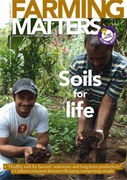Historically, scientists learnt from farmers to unravel the interplay between nature and farming. Pablo Tittonell believes that this year, the International Year of Soils, presents an opportunity to foster a true dialogue of wisdoms, bringing farmer knowledge and scientific knowledge closer together again.

Historically, soil scientists learnt from farmers’ knowledge to unravel the complex interplay between nature and farming (see for example the works of Jethro Tull on the effects of horse-hoeing on soil quality from 1733!). But soil management practices and technologies in modern industrial agriculture have upset this dialogue with assumptions that are often based on an oversimplified understanding of nature.
Let’s take the example of soil biology. In the past, it was common to hear experts say that nutrient release processes in the soil are the same in forests, pastures and agricultural fields where chemical fertilizers are applied. But everevolving science now shows us that this is not true. Today, we are able to map the DNA of soil microorganisms, and can identify the species present, how they relate to each other, and how they contribute to soil functions. In other words, we have found new ways to unravel and better understand the ecological networks in our soils, how they are affected by farm management, and how they impact the resilience of agroecosystems.
Understanding the complex interactions and synergies in the soil is essential in the science and practice of agroecology. Cutting-edge research shows that in organically managed soils, the interactions between species are more complex than in soils managed with chemical fertilizers or nutrientrich slurry. It shows that such complex interactions contribute to better retention and timely release of nutrients – and this builds healthier soils and reduces environmental impacts. Farmers are more than often very aware of the links between the life in their soils, crop yields, and the ability to sustain them – or, in scientific language: between soil biodiversity and resource efficiency. They adapt their practices following detailed observation over many years.
These links, long known to farmers, can now be understood in more detail through DNA mapping and other laboratory techniques. And as is commonly the case in recent history, advances in agricultural science are really just about research catching up with farmers’ knowledge. It is my hope that the International Year of Soils will foster a true dialogue of wisdoms, bringing farmer knowledge and scientific knowledge closer together again, to build better opportunities for sustainable soil management.
Pablo Tittonell
Pablo Tittonell is Professor of the Farming Systems Ecology group at Wageningen University and Research Centre, the Netherlands. He is a board member of the African Conservation Tillage network and the European focal point of the Latin American Scientific Society on Agroecology (SOCLA). Farming Matters is honoured to welcome Pablo Tittonell as its new regular columnist for 2015.
Email: pablo.tittonell@wur.nl

